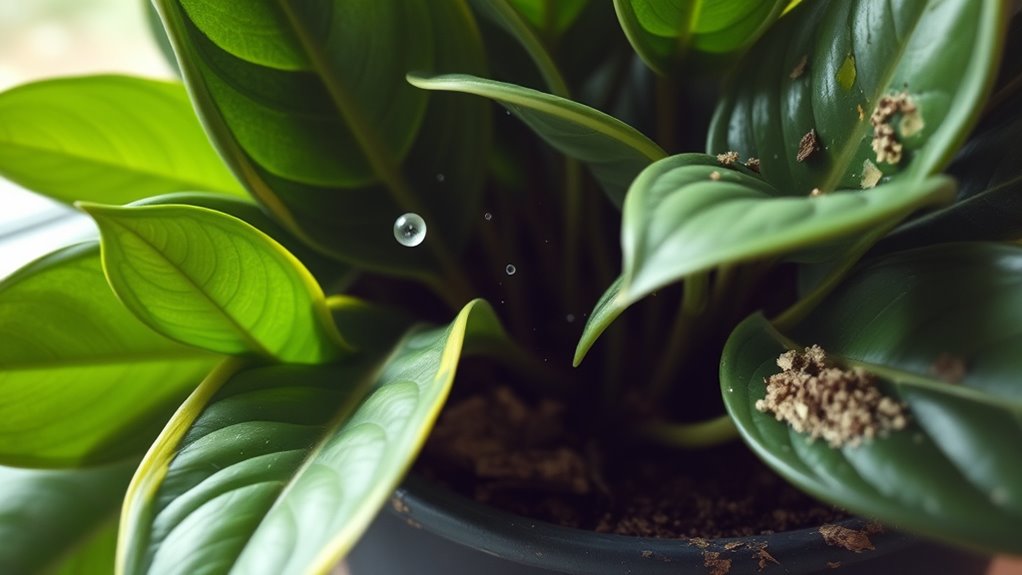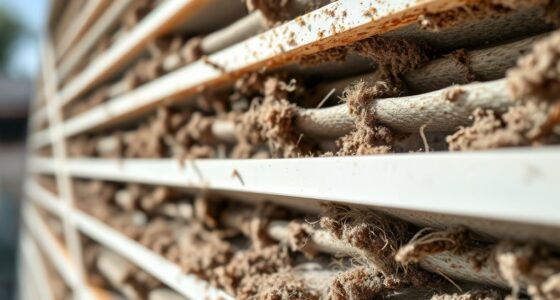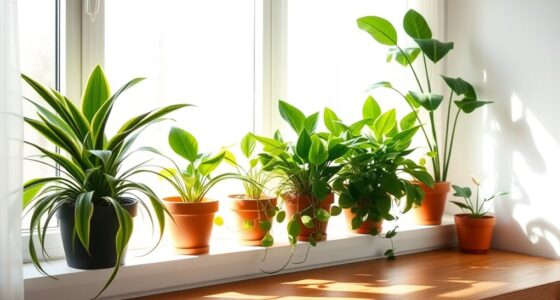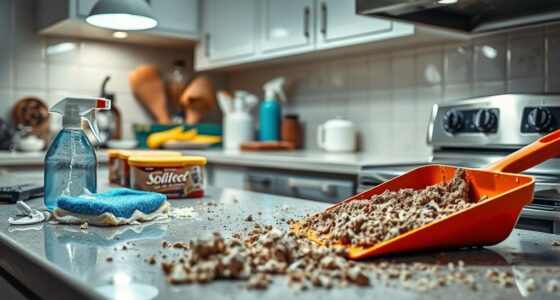Your houseplant might be worsening your indoor air quality because it could release toxins, harbor mold, or accumulate chemical residues from pesticides and contaminated soil. Overwatering or poor maintenance can lead to mold growth, while inadequate airflow allows pollutants to build up. Additionally, some plants produce allergens or VOCs that irritate your respiratory system. If you want to understand how to identify and prevent these issues, keep exploring these hidden plant risks.
Key Takeaways
- Overwatering and poor drainage promote mold growth in soil, releasing spores into indoor air.
- Pesticide residues on plants or soil can emit chemicals that irritate respiratory systems.
- Excessive humidity from overwatering fosters mold and mildew, reducing indoor air quality.
- Stagnant air and lack of ventilation trap VOCs and pollutants emitted by plants.
- Certain plants release pollen or particles that may trigger allergies or respiratory issues indoors.
The Hidden Risks of Certain Plant Species
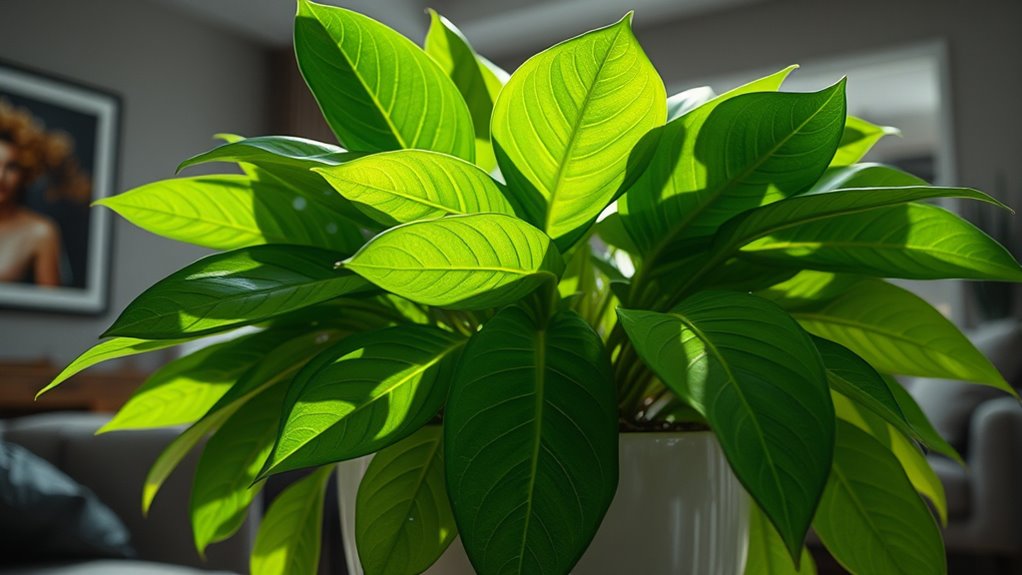
While houseplants can improve air quality and add beauty to your home, some species pose hidden risks. Plant toxicity is a major concern, especially if you have children or pets who might ingest parts of the plant. Many popular houseplants contain toxins that can cause symptoms ranging from mild irritation to severe poisoning. Additionally, certain plants are prone to pest infestations, which can spread quickly and compromise your home’s air quality. Pests like spider mites or scale insects not only damage the plant but can also trigger allergies or respiratory issues. It’s essential to research each species before bringing it into your space, ensuring it’s safe and healthy. Being aware of plant toxicity and pest risks helps you enjoy your houseplants without unintended health hazards.
Pesticides and Chemicals Used in Cultivation
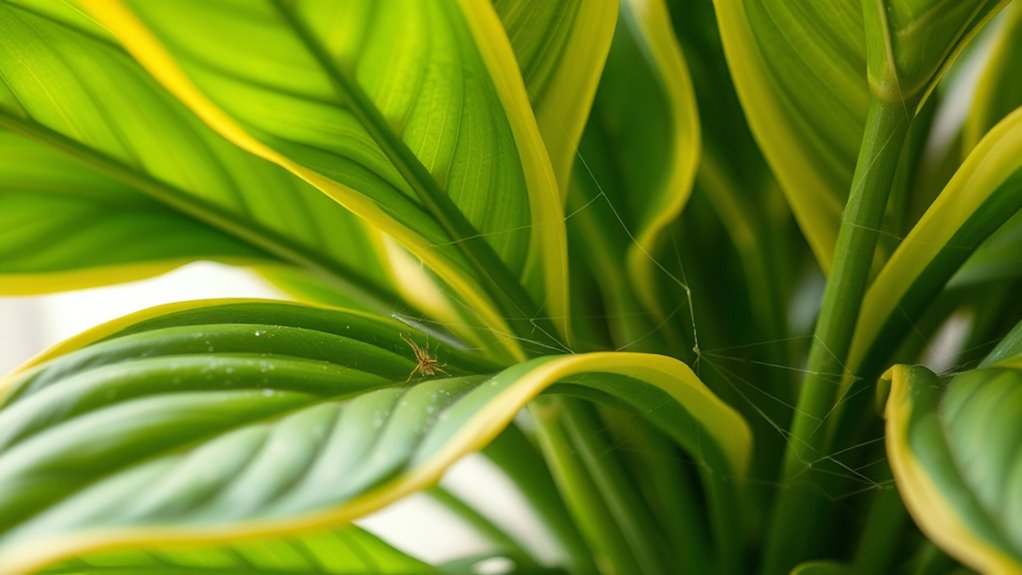
Have you ever considered the chemicals used to grow your houseplants? Many cultivated plants carry chemical residues from pesticides and fertilizers. These pesticide residues can linger on leaves and soil, releasing toxins into your indoor air. Even if you wash your plants, traces of chemicals may remain, especially if the plant was heavily treated. Some pesticides contain chemicals that are known to cause respiratory irritation or other health issues over time. When these residues become airborne, they can contribute to indoor air pollution, potentially worsening allergies or asthma symptoms. Choosing organically grown plants or those grown without synthetic chemicals can help reduce your exposure. Being aware of pesticide residues guarantees you’re not unintentionally introducing harmful chemicals into your home environment. Additionally, opting for vetting plants from reputable sources can further decrease the risk of chemical exposure.
Overwatering and Mold Growth
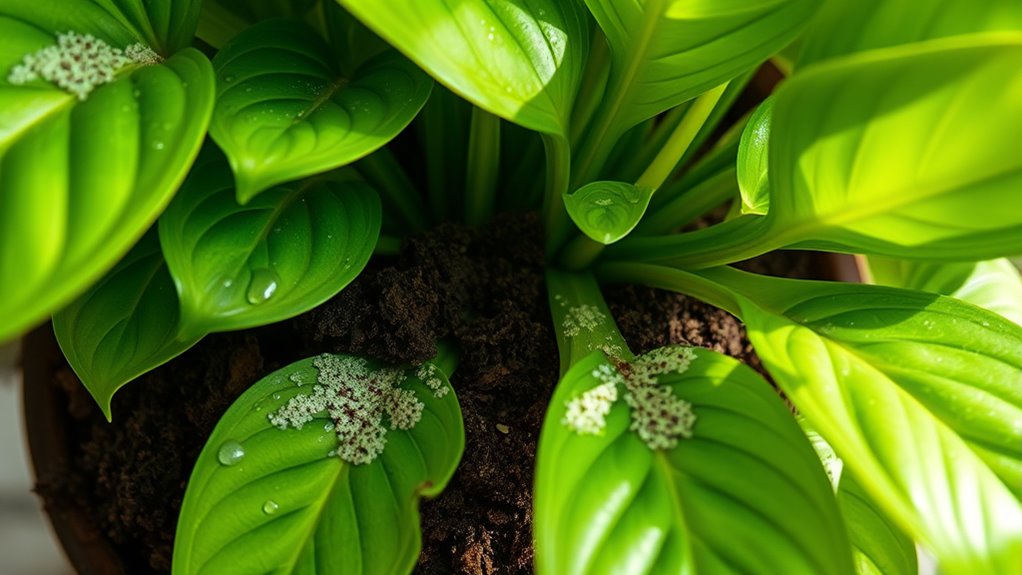
Overwatering your houseplants can lead to excess water that stays in the soil, creating a perfect environment for mold to develop. Mold growth not only damages your plants but can also negatively impact indoor air quality. To prevent this, make certain you water only when necessary and provide proper drainage. Additionally, trust issues with plant care can cause neglect, increasing the risk of overwatering and mold.
Excess Water Accumulation
Excess water accumulation in houseplants often results from overwatering, which can lead to mold growth and other health issues for both the plant and your indoor air quality. When you give your plant too much water, excess water collects in the soil and around the roots, creating a damp environment. This stagnation can cause root rot, a disease that damages the plant’s roots and hampers nutrient absorption. Over time, this compromised root system weakens the plant and fosters mold development on the soil surface, releasing spores into the air. To prevent these issues, guarantee you water only when the top inch of soil feels dry and use proper drainage. Avoid leaving excess water sitting in the pot, which can harm your plant and compromise your indoor air quality. Incorporating Kia Tuning techniques like upgrading the suspension can improve your vehicle’s handling, but in your home, proper watering practices are key to maintaining healthy air quality.
Mold Development Risks
When water sits too long in the soil and around the roots, it creates the perfect environment for mold to develop. Overwatering encourages fungal spores to grow, leading to plant mold that can harm your houseplants. Mold growth not only damages the plant but also releases airborne spores that may affect your indoor air quality. To prevent this, monitor watering carefully and guarantee proper drainage. Ensuring the right color accuracy in your watering habits can also help maintain healthy soil conditions.
Soil Contaminants and Toxicity

Have you ever considered that the soil in your houseplants might harbor harmful contaminants? Soil can develop issues like soil pH imbalance, which affects nutrient availability and can stress your plant, making it release harmful compounds into the air. Nutrient toxicity occurs when plants absorb too much fertilizer, leading to toxic buildup in the soil. This excess can leach into your indoor environment, releasing volatile substances that degrade air quality. Contaminated soil can also harbor toxins from previous treatments or pollutants, which may be absorbed by the plant and emitted into your home. Regularly checking soil pH and avoiding over-fertilization helps prevent these problems. Healthy soil promotes a thriving plant that’s less likely to release harmful substances into your indoor air. Additionally, using soil testing can help detect and address issues before they impact your plant and indoor air quality.
Allergens and Respiratory Irritants

Did you know that some houseplants can trigger allergies or irritate your respiratory system? Certain plants produce pollen allergies that can worsen symptoms for sensitive individuals. Even without visible flowers, some foliage releases airborne particles that act as respiratory irritants. These particles can cause sneezing, coughing, or nasal congestion, especially if you have existing allergies or asthma. Plants like ferns or flowering species might seem harmless but can still emit allergens. It’s important to monitor how your body reacts when introducing new houseplants, particularly if you notice increased respiratory discomfort. Additionally, automation in business advancements have led to more efficient ways to improve indoor air quality through smart ventilation systems. Choosing hypoallergenic plants or ensuring good ventilation can help reduce these risks. Being aware of the potential for allergens and respiratory irritants allows you to enjoy your houseplants without compromising your air quality.
Indoor Humidity and Mold Proliferation
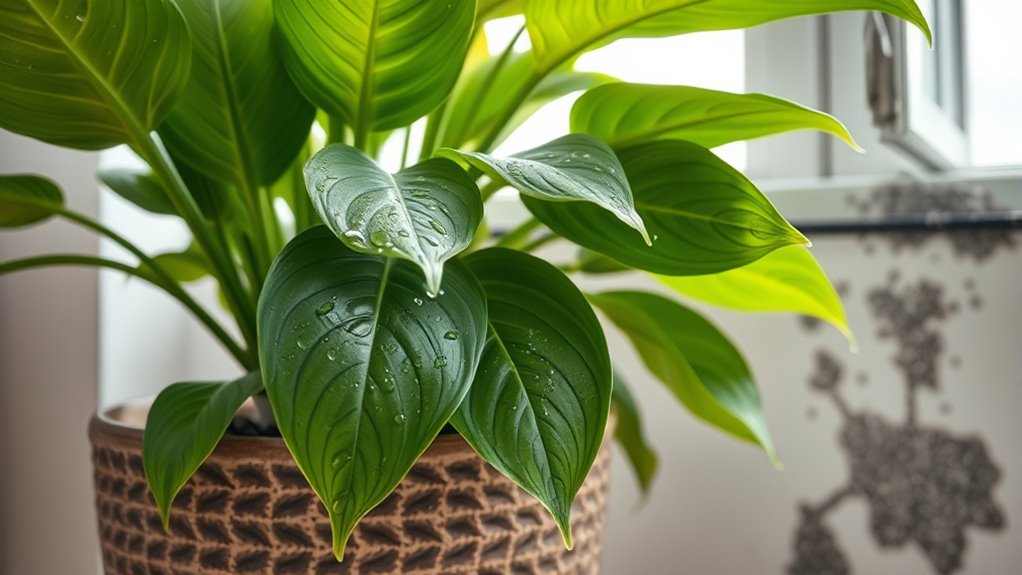
While some houseplants can help improve air quality, improper humidity levels can create problems of their own. High humidity encourages mold spores to thrive, especially in areas where excess moisture persists. Without proper humidity control, damp soil or leaves can become breeding grounds for mold, releasing spores into the air you breathe. These spores may worsen allergies or respiratory issues, counteracting the benefits of your plants. To prevent this, keep indoor humidity levels balanced—ideally between 30-50%. Use dehumidifiers or ventilation to reduce excess moisture, and avoid overwatering your plants. Regularly inspecting and cleaning your houseplants can also help minimize mold growth. Proper air quality management is essential to prevent mold proliferation and protect both your air and your plants’ health.
Release of Volatile Organic Compounds (VOCs)
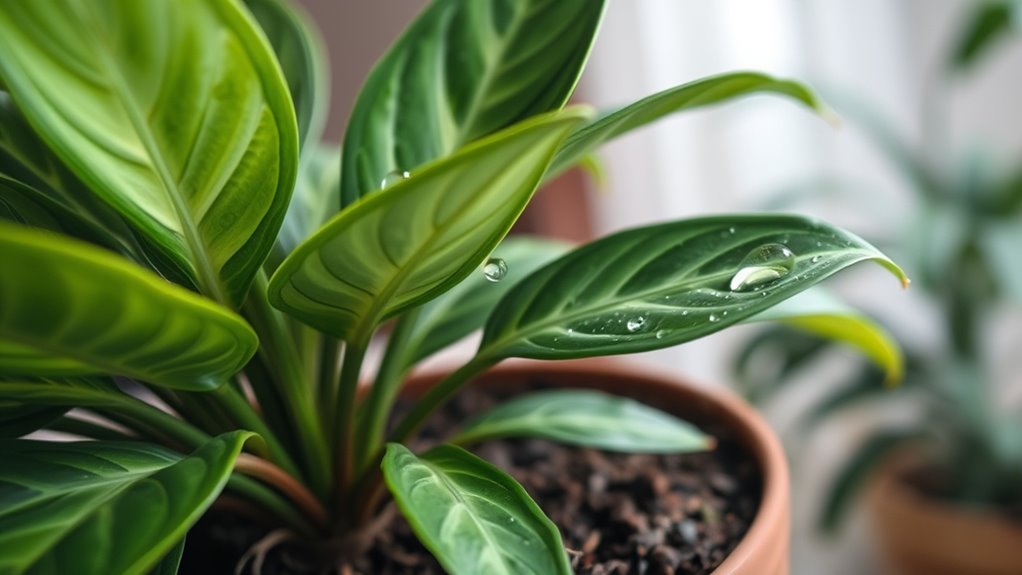
Many houseplants naturally release volatile organic compounds (VOCs) into the air as part of their metabolic processes, which can influence indoor air quality. These VOC emissions often contribute to the plant’s fragrance, giving your space a fresh or earthy scent. However, this plant fragrance isn’t always harmless; it can also contain compounds that may irritate your respiratory system or trigger allergies. When you have multiple plants, VOC emissions can accumulate, subtly altering the air you breathe. Imagine inhaling a gentle herbal aroma from your pothos or a citrusy scent from a lemon ivy—yet, beneath that pleasant smell, VOCs are present. Be aware that some plant fragrances, especially from certain species, can become a source of indoor pollution rather than relief. The presence of VOCs highlights the importance of choosing comfort solutions for indoor plants that minimize potential air quality issues.
Poor Air Circulation and Stagnation
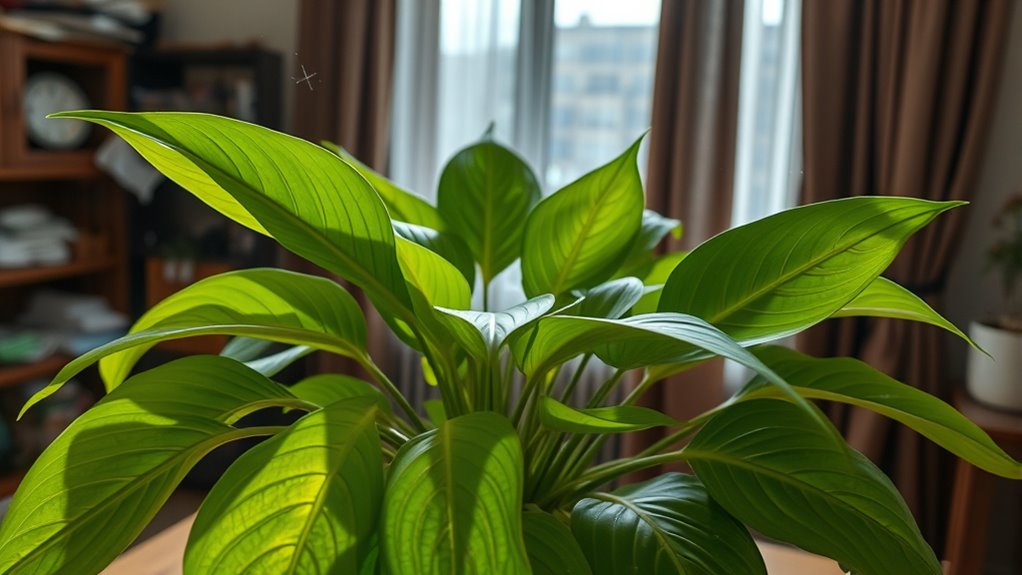
Poor air circulation can cause indoor air to become stagnant, trapping pollutants and reducing overall air quality. When airflow barriers like furniture or thick curtains block movement, stagnant zones form, where air remains still. These stagnant zones allow pollutants to concentrate near your houseplants, potentially harming you. To improve air quality, guarantee good ventilation and avoid creating airflow barriers. Additionally, understanding home essentials can help you optimize your space for better airflow and healthier indoor environments.
Inadequate Maintenance Leading to Decay
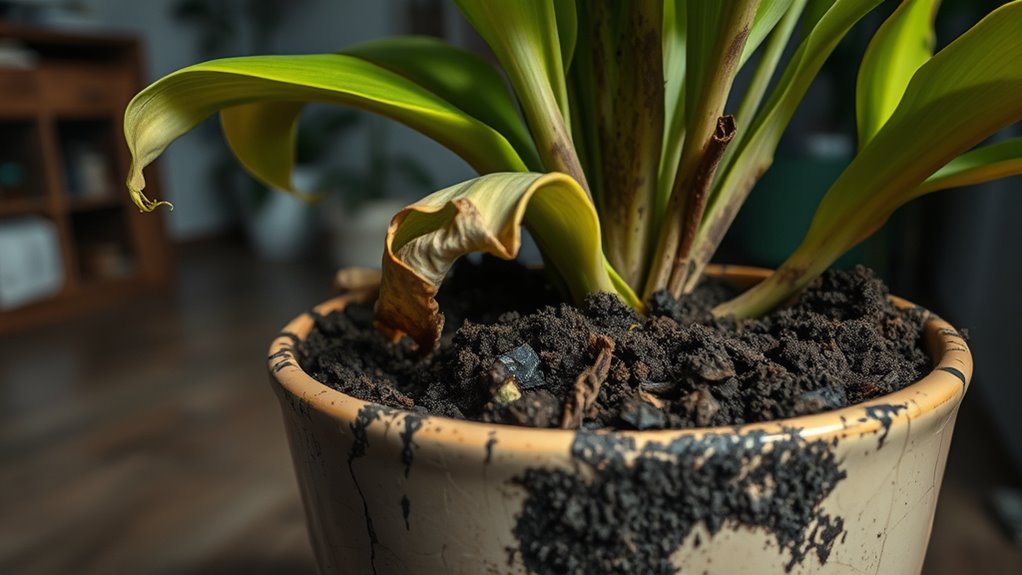
Neglecting regular maintenance can cause your houseplants to decay quickly, undermining their health and your indoor air quality. When you ignore watering issues or pruning neglect, plants become weak and prone to rot or disease. Dead leaves and decaying stems create mold and bacteria, which can worsen indoor air quality. You might notice:
- Overwatering leading to root rot and mold growth
- Underwatering causing wilting and leaf drop
- Dead or yellowing leaves left unpruned, attracting pests
- Stagnant, decaying plant matter fostering mold and bacteria
These issues weaken your plants, making them less effective at purifying air. Without proper care, your houseplants can turn into sources of pollutants instead of solutions, so regular maintenance is essential for healthy, air-purifying plants.
Misconceptions About Air Purifying Plants
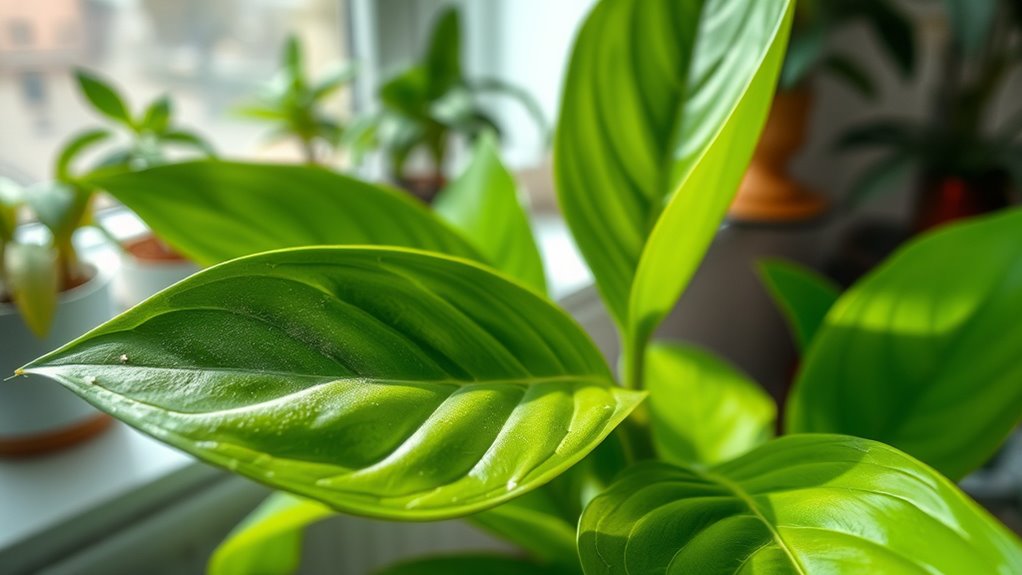
While maintaining your houseplants is essential for their health and air-cleaning ability, misconceptions often lead people to overestimate what these plants can achieve. Many believe that placing multiple plants everywhere will dramatically improve air quality, but plant placement alone isn’t a cure-all. In fact, overloading a space with decorative choices of plants can create clutter and hinder airflow. Some assume certain species are highly effective at purifying indoor air, yet scientific evidence shows their impact is limited in typical home environments. It’s easy to fall for the idea that more plants mean better air, but understanding each plant’s true capabilities helps set realistic expectations. Proper placement, combined with good ventilation, actually makes a bigger difference than just filling your space with decorative, air-purifying plants.
Frequently Asked Questions
Can Houseplants Actually Increase Indoor Air Pollution Levels?
You might wonder if houseplants can increase indoor air pollution, but they typically help by absorbing airborne toxins and improving air quality. However, if plants are overwatered or kept in poor soil, mold and bacteria can grow, releasing pollutants. So, while generally beneficial, poorly maintained houseplants could contribute to indoor air pollution. Proper care guarantees they continue to absorb pollutants and keep your air cleaner.
Are All Popular Indoor Plants Safe and Non-Toxic to Pets?
Not all popular indoor plants are safe for pets; some have toxic plant toxicity that can harm your furry friends. You should always check pet safety before bringing a new plant into your home. While many plants are non-toxic, others may cause illness if ingested. To protect your pets, research each plant’s toxicity level and opt for pet-safe options, ensuring a healthier environment for everyone.
How Often Should I Replace Potting Soil to Avoid Contamination?
You should replace your potting soil every 1 to 2 years to prevent soil contamination. Regularly refresh your potting schedule, especially if you notice mold, odors, or plant health decline. This helps eliminate pests, fungi, and old nutrients that can harm your plants and reduce air quality. By staying on top of soil replacement, you ensure a healthier environment for your houseplants and improve indoor air quality.
Do Natural Fertilizers Pose Risks Similar to Chemical Pesticides?
Natural fertilizers generally pose fewer risks compared to chemical pesticides, but they can still cause issues if misused. You might risk nutrient imbalances or over-fertilization, which can harm your plants. Unlike chemical pesticides, natural fertilizers are less likely to introduce harmful chemicals into your home. However, always follow application instructions carefully to avoid potential problems. Proper use helps keep your houseplants healthy without jeopardizing your indoor air quality.
Can Plant Pests or Mold Spread Pathogens to Humans Indoors?
Plant pests and mold spores can spread pathogens to humans indoors, especially if you have allergies or asthma. Pests like aphids or mealybugs may carry bacteria or viruses, while mold spores thrive in damp conditions, releasing allergens into the air. You should regularly inspect your houseplants, maintain proper humidity, and clean surfaces to reduce the risk of these pests and mold spreading harmful pathogens to you and your family.
Conclusion
While houseplants can bring joy and life to your space, it’s worth remembering they might also hold subtle surprises. By paying attention to their care and origins, you can nurture a healthier environment for both yourself and your green friends. Embrace mindful choices, and let your plants genuinely enhance your home’s comfort without unintended shadows. After all, a little awareness goes a long way in creating a truly welcoming and invigorating sanctuary.
